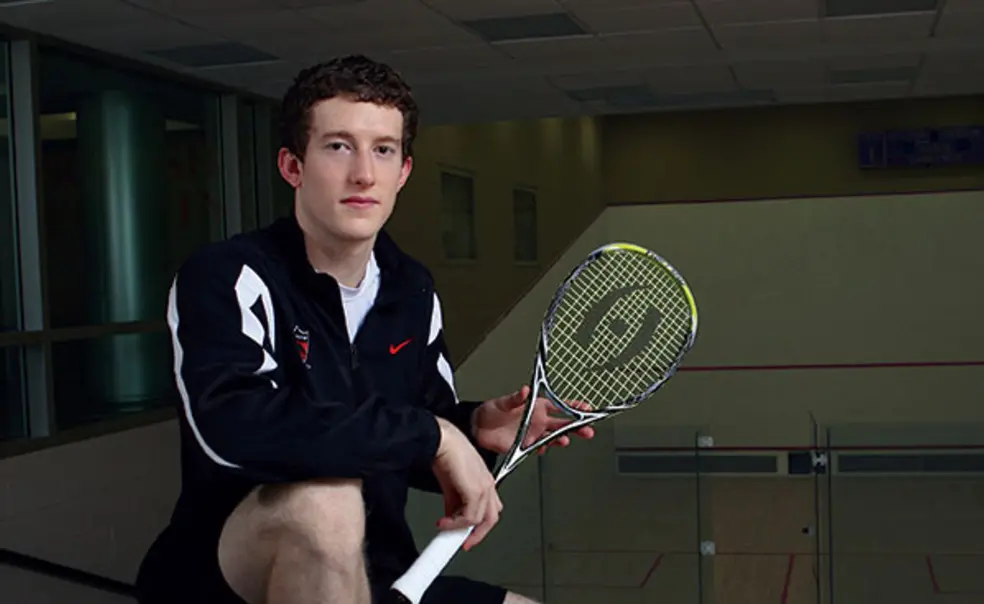Todd Harrity ’13 Pushes Himself on the Pro Squash Tour
Todd Harrity ’13 has loved racket sports for as long as he can remember. The son of two avid squash players, Harrity grew up playing squash, tennis, and ping pong at Merion Cricket Club in Haverford, Pa.
He eventually focused on squash because it seemed “more continuous” — squash is played in a confined space, so players waste less time picking up balls. Harrity didn’t start out with the intention of playing the sport at the collegiate level, let alone professionally, but that’s where his career has taken him: Now a touring pro, Harrity will compete next week in the J.P. Morgan Tournament of Champions, one of professional squash’s premier events held annually in New York’s Grand Central Terminal.
“One thing just led to the next,” he says. “I played because I enjoyed it, that was the most important thing. I liked improving. I liked just finding ways to improve.”
Harrity soon became the top-ranked high school-aged player in the country and was recruited to join Princeton’s varsity squash team, drawn by the promise of working with then-head coach Bob Callahan ’77 as well as with plasma physicist Neil Pomphrey, who moonlighted as the team’s assistant coach.
Pomphrey remembers the young Harrity as “a really driven player,” though rather one-dimensional. Pomphrey says Harrity relied on his innate ability to quickly read his opponent's shots and get to the squash ball early, but otherwise played a very conservative style of squash.
“I think that is a little bit my personality. I’m not a big risk taker in regular life,” says Harrity. “It takes me ages to make decisions. It’s a big ordeal for me, weighing pros and cons.”
Harrity’s unassuming nature has often led opponents to underestimate him, says Steve Harrington ’13, Harrity’s childhood friend and former Princeton teammate. That is, until they meet “The Todd,” Harrington’s name for Harrity’s on-court persona. There, they faced the former Princeton No. 1’s steady onslaught of relatively plain, but excellently executed shots.
“He has an amazing focus when he’s on the court,” says Harrington. “It’s like playing a computer for some guys.”
“Todd is way patient,” says Ramit Tandon, Harrity’s longtime rival and former Columbia University No. 1, whose aggressive style of play contrasts sharply with Todd’s. “He waits for you to make mistakes.”
For all of Harrity’s focus on the court, however, he’s often hilariously absent-minded off the court. As a collegiate player, Harrity repeatedly forgot to bring his squash rackets to matches, remembers Harrington. During Harrity’s freshman year, Pomphrey remembers having to drive 20 minutes from New Haven to Choate Rosemary Hall, where the team had just played, to locate Harrity’s misplaced winter coat. (“It was freezing!” says the still incredulous Pomphrey.) And there was the incident in Rochester, N.Y., when the team had to scramble last minute to find Harrity proper squash shoes at a local Dick’s Sporting Goods before a match.
Harrity instead saved his attention for the task of upping his game, often seeking extra coaching sessions or talking strategy with Pomphrey over lunch, remembers former teammate and current assistant coach Tyler Osborne ’15. In 2011, when Tandon, a native of India, joined Columbia and Egyptian Ali Farag joined Harvard, raising the level of squash in the Ivy League, Harrity too rose to the occasion. Despite losing to them early on, Harrity finished his Princeton career by defeating Farag when Princeton and Harvard met during the 2013 National Team Championships.
Afterward, Harrity faced the decision of whether to leave the sport that had become such an integral part of his identity or to stick with it, despite the fact that no American male had ever broken into the most elite ranks of professional squash. He decided to go pro, but denies it was the riskier option, citing the support he has received from coaches and from the U.S. Squash Association, the sport’s governing body in America.
Harrington says his old friend is still the same, still “a bit of space cadet,” but Tandon notices a difference on-court, comparing the change to that of a basketball player who has made the jump from college to the NBA. “He’s playing faster, taking his space on the court,” he says. “In college, you’re a nice kid and learn to play the right way. On the pro tour, it’s kind of street squash.”
Harrity admits he’s more aggressive now, on the pro tour. “You’re always trying to push that barrier and be brave and go for it and commit yourself because you want to improve and be better,” he says. “You can’t just play it so safe all the time.”












No responses yet